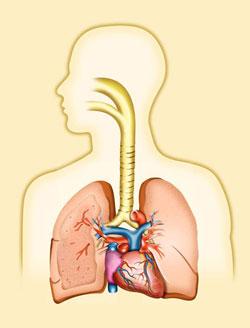Health Effects of Ozone Pollution
 Ozone is a powerful oxidant that can irritate the airways.
Ozone is a powerful oxidant that can irritate the airways.
Ozone in the air we breathe can harm our health, especially on hot sunny days when ozone can reach unhealthy levels. Even relatively low levels of ozone can cause health effects.
Who is at risk?
People most at risk from breathing air containing ozone include people with asthma, children, older adults, and people who are active outdoors, especially outdoor workers. In addition, people with certain genetic characteristics, and people with reduced intake of certain nutrients, such as vitamins C and E, are at greater risk from ozone exposure.
Children are at greatest risk from exposure to ozone because their lungs are still developing and they are more likely to be active outdoors when ozone levels are high, which increases their exposure. Children are also more likely than adults to have asthma.
What health problems can ozone cause?
 Ozone can cause the muscles in the airways to constrict, trapping air in the alveoli. This leads to wheezing and shortness of breath.
Ozone can cause the muscles in the airways to constrict, trapping air in the alveoli. This leads to wheezing and shortness of breath.
Ozone can cause the muscles in the airways to constrict, trapping air in the alveoli. This leads to wheezing and shortness of breath.
- Make it more difficult to breathe deeply and vigorously.
- Cause shortness of breath, and pain when taking a deep breath.
- Cause coughing and sore or scratchy throat.
- Inflame and damage the airways.
- Aggravate lung diseases such as asthma, emphysema, and chronic bronchitis.
- Increase the frequency of asthma attacks.
- Make the lungs more susceptible to infection.
- Continue to damage the lungs even when the symptoms have disappeared.
- Cause chronic obstructive pulmonary disease (COPD).
These effects have been found even in healthy people, but can be more serious in people with lung diseases such as asthma. They may lead to increased school absences, medication use, visits to doctors and emergency rooms, and hospital admissions.
Long-term exposure to ozone is linked to aggravation of asthma, and is likely to be one of many causes of asthma development. Long-term exposures to higher concentrations of ozone may also be linked to permanent lung damage, such as abnormal lung development in children.
Recent studies consistently report associations between short-term ozone exposures and total non-accidental mortality, which includes deaths from respiratory causes. Studies suggest that long-term exposure to ozone also may increase the risk of death from respiratory causes, but the evidence is not as strong as the evidence for short-term exposure.
How can I reduce these health risks?
 With inflammation, the airway lining is damaged. It has been compared to the skin inflammation caused by sunburn.
With inflammation, the airway lining is damaged. It has been compared to the skin inflammation caused by sunburn.
The AirNow Web site provides daily air quality reports for many areas. These reports use the Air Quality Index (or AQI) to tell you how clean or polluted the air is.
EnviroFlash, a free service, can alert you via email when your local air quality is a concern. Sign up at www.enviroflash.info.
Pamphlets and other resources:
- Printable pamphlets and booklets about ozone effects on air quality and health.
- EPA’s Air Quality Guide for Ozone Provides detailed information about what the Air Quality Index means. Helps determine ways to protect your family's health when ozone levels reach the unhealthy range, and ways you can help reduce ozone air pollution.
- Ozone and Your Patients' Health: Training for Health Care Providers Designed for family practice doctors, pediatricians, nurse practitioners, asthma educators, and other medical professionals who counsel patients about asthma and respiratory symptoms.
- AirNow Health Providers Information Provides information on how to help patients protect their health by reducing their exposure to air pollution.
- EPA’s Asthma Web Site EPA's Communities in Action Asthma Initiative includes programs to address indoor and outdoor environments that cause, trigger or exacerbate asthma symptoms.
